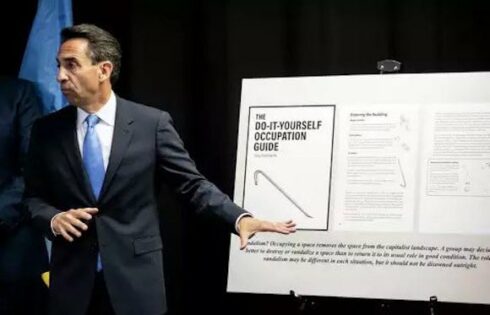
Professor’s note on draft says data ‘undermines the narrative,’ according to documents obtained by open records
A widely-cited study used to support racial concordance, the theory that medical professionals provide better care to patients of the same race, appears to have left out data that “undermine[d] the narrative,” according to an open records investigation.
The 2020 study, led by George Mason University business Professor Brad Greenwood, found that “when Black newborns are cared for by Black physicians, the mortality penalty they suffer, as compared with White infants, is halved.”
However, documents obtained through the Freedom of Information Act show that a “key data point was edited out of the body of the paper, apparently because it muddled the downstream policy implications of the study,” the Daily Caller reports.
Do No Harm, which opposes identity politics in medicine, made the open records request and shared it first with the Daily Caller:
The study originally asserted that white babies died less frequently with white doctors.
“White newborns experience 80 deaths per 100,000 births more with a black physician than a white physician, implying a 22% fatality reduction from racial concordance,” an unpublished draft reads.
But the study’s lead author Brad N. Greenwood wrote in the margin: “I’d rather not focus on this. If we’re telling the story from the perspective of saving black infants this undermines the narrative.”
“That’s not how scientists speak,” Ian Kingsbury, director of research at Do No Harm, told the Daily Caller News Foundation. “It’s not a smoking gun, but it’s certainly suggestive they were pushing one narrative or another.”
The data point was axed.
“Concordance appears to bring little benefit for White newborns,” the paper reads.
However, the researchers did include the data point in the appendix of the study, according to the report.
Another document showing an email from Greenwood to the co-authors suggests “he had a predetermined desired conclusion, a strong correlation between physician race and clinical outcomes,” the report states.
“Good news – I caught my obligatory coding error, updated results are attached. Bad news- results are not as strong. We lose the effect when a physician fixed effect is included for newborns,” Greenwood wrote in the 2019 email. “I think there is enough to tell a story here.”
Neither Greenwood nor co-author Rachel Hardeman, a professor of health and racial equity at the University of Minnesota, immediately responded to an email from The College Fix asking for their response to the report. The media relations office for Hardeman’s Center for Antiracism Research for Health Equity also did not respond.
Their research has received widespread attention. U.S. Supreme Court Justice Ketanji Brown Jackson even mentioned it in her dissent to Students for Fair Admissions v. Harvard. The 2023 decision overturned race-based college admissions policies.
Last fall, a Harvard University professor published research refuting the study.
As The Fix reported, Professor George Borjas and Manhattan Institute fellow Robert VerBruggen found the conclusion of the 2020 study fell apart when they factored in infants’ birth weights.
Their research, published in the Proceedings of the National Academy of Sciences, used the same data as the 2020 study to replicate the findings, but also controlled for low birth weights.
“The estimated racial concordance effect is substantially weakened, and often becomes statistically insignificant, after controlling for the impact of very low birth weights on mortality,” the researchers found.
MORE: Former med school dean debunks push to match patients and doctors by race
IMAGE CAPTION AND CREDIT: An African American infant looks up at its mother. Art Photo/Shutterstock
Like The College Fix on Facebook / Follow us on Twitter






Please join the conversation about our stories on Facebook, Twitter, Instagram, Reddit, MeWe, Rumble, Gab, Minds and Gettr.